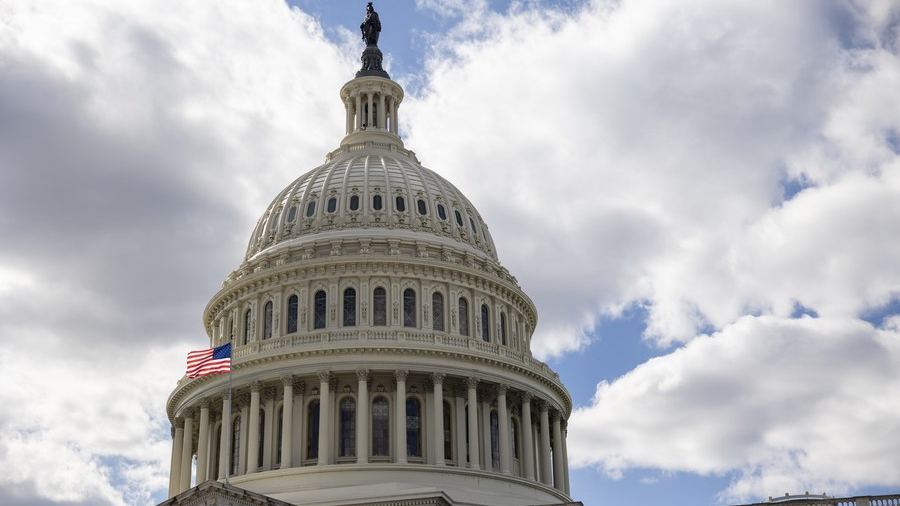
The U.S. Capitol building in Washington, D.C., U.S., March 6, 2021. /Xinhua
The U.S. Capitol building in Washington, D.C., U.S., March 6, 2021. /Xinhua
Editor's note: Anthony Moretti is an associate professor at the Department of Communication and Organizational Leadership at Robert Morris University. The article reflects the author's opinions and not necessarily those of CGTN.
The United States Trade Representative (USTR) is required annually to inform Congress and the nation about China and its commitment to free trade. The latest report was released this week, and there is plenty for China bashers to embrace. Before they do that, they might want to consider the incomplete picture they are receiving about what is unfolding on the global stage.
The report claims China has done little in the 20 years it has been part of the World Trade Organization to align its economic policies with Western norms. China is accused of advancing "a state-led, non-market approach to the economy and trade has increased rather than decreased over time, and the mercantilism that it generates has harmed and disadvantaged U.S. companies and workers, often severely."
Glossed over is the most damaging decision of the last couple of years to U.S. companies and workers: former President Donald Trump's choice to hand down tariffs against China. The respected U.S.-China Business Council (USBC) announced about one year ago that the tariffs had resulted in roughly 245,000 American jobs being lost.
The USBC affirmed then that "cutting back tariffs would likely benefit the U.S. economy and create jobs. Even a moderate rollback in tariffs could increase economic growth and stimulate employment growth."
Has the Biden Administration listened? No. In fact, when the president was asked about the tariffs less than one month ago, he said he was "not there yet" when it came to doing what is painfully obvious: throwing the tariffs into the trash.
Readers of the USTR report will not find any acknowledgment of the disastrous effects of the tariffs on the U.S.; instead, they will come to believe tariffs somehow demonstrate sound and rational policy. This denial of reality cannot be ignored.
The USTR report also accuses China of not being an honest broker in bilateral negotiations: "The United States approached its bilateral dialogues with China in good faith and put a great deal of effort into them. These dialogues were intended to push China toward complying with and internalizing WTO rules and norms and making other market oriented changes. However, they only achieved isolated, incremental progress."
This criticism demands a follow-up question: Has the U.S. practiced "good faith" while pursuing trade with the global community?
We must remember the so-called Washington Consensus, a set of policies that dominated throughout the second half of the last century, came with significant strings attached: Governments were expected to align domestic policies to Western ideals in order to become a U.S. trade partner.
Stefan Halper's excellent book "The Beijing Consensus," which was published in 2010, affirms that China has unveiled a new approach: Providing opportunities for economic growth and the improvement of a country's GDP without demanding specific and proscribed domestic policies be followed.

Screenshot from the official website of the office of the United States Trade Representative.
Screenshot from the official website of the office of the United States Trade Representative.
China is also accused by the USTR of looking askance at the formation of unions that might benefit Chinese workers. Funny that Beijing would face such criticism when one recognizes that for decades Washington has been no friend of U.S. union workers, and political leaders on both sides of the political aisle have walked lockstep with corporations in erasing unions from the American economic landscape. The result: According to the Pew Research Center, roughly one in 10 workers was part of a union in 2017, while almost one in three had been in 1954.
Moreover, recent high-profile efforts by Amazon to undermine the formation of unions at its various warehouses confirm that Washington ought to remember the adage about rocks and glasshouses before lobbing accusations at Beijing or any other national government, for that matter.
The report seeks to convey a stern message: "China plainly does not hold the same core values that we hold, and its state-led, non-market approach to the economy and trade conflicts in significant and harmful ways with our market-oriented approaches, to the detriment of our workers and businesses."
I am left to wonder what answer we would receive if you and I traveled to multiple places in Latin America and the Middle East and asked whether the U.S. has acted with "detriment" to their workers and businesses. Come to think of it, you and I know what that answer would be.
The USTR bashes China for "seeking to establish new global norms that better reflect and support China's interests," but it refuses to look at how U.S. hegemonic practices across the globe have led to deprivation or worse.
Admire or criticize the domestic and international economic policies pursued by China all you want, but you must admit they have led to a stronger nation with millions of people raised out of poverty. China is a global power and, to borrow a sports cliche, refuses to play the game like others. Washington does not like that.
Washington must do more to facilitate improved economic, political, cultural and educational relations with Beijing instead of leveling accusations of which it could easily be found guilty.
(If you want to contribute and have specific expertise, contact us at opinions@cgtn.com.)

